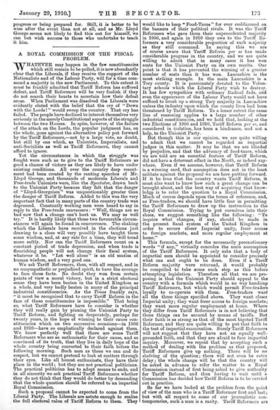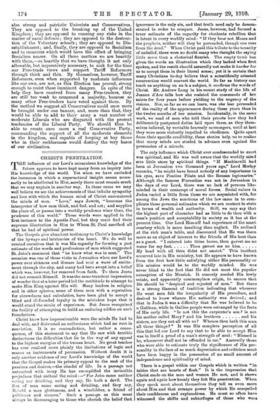A ROYAL COMMISSION ON THE FISCAL PROBLEM.
WHATE V ER may happen in the few constituencies which still remain to be polled, it is now abundantly " clear that the Liberals, if they receive the support of the Nationalists and of the Labour Party, will for a time com- mand a majority in the new Parliament. To this extent it must be frankly admitted that Tariff Reform has suffered defeat, and Tariff Reformers will be very foolish if they do not search their hearts to ascertain how their defeat arose. When Parliament was dissolved the Liberals were evidently elated. with the belief that the cry of "Down with the Lords!" would sweep the country. That cry has failed. The people have declined to interest themselves very seriously in the merely Constitutional aspects of the struggle between the two Houses. In spite, however, of the failure of the attack on the Lords, the popular judgment has, on the whole, gone against the alternative policy put forward. by the Tariff Reformers,—not by a large vote, no doubt, but still by one which, as Unionists, Imperialists, and. anti-Socialists as well as Tariff Reformers, they cannot afford to ignore.
Yet the circumstances in which the struggle was fought were such as to give to the Tariff Reformers as good. a chance of victory as they are likely to have under existing conditions. All over the country deep resent- ment had been created by the ranting speeches of Mr. Lloyd George, and thousands of moderate Liberals and Free-trade Unionists were, like the Spectator, drawn back to the Unionist Party because they felt that the danger of "Lloyd.-Georgeism ' was unquestionably greater than the danger of Tariff Reform. Added to this was the very important fact that in many parts of the country trade was depressed. Constantly working men were heard. to say in reply to the Free-trade canvassers : "Well, things are so bad now that a change can't hurt us. We may as well try." It is hardly likely that these two favourable circum- stances will again be found. in concurrence. The shaking which the Liberals have received. in the elections just drawing to a close will very possibly have taught them some wisdom, and, at any rate for a time, they will tread more softly. Nor can the Tariff Reformers count on a constant period of trade depression, and when trade is flourishing people will not change their fiscal system, whatever it be. "Let well alone" is an old. maxim of human wisdom, and a very good one.
We ask Tariff Reformers, then, with all respect, and in no unsympathetic or prejudiced spirit, to have the courage to face these facts. No doubt they won from certain points of view a moral victory, but in a strict electoral sense they have been beaten in the United Kingdom as a whole, and very badly beaten in many of the principal industrial constituencies. As the Times frankly says, "it must be recognised. that to carry Tariff Reform in the face of these constituencies is impossible." That being so, what Tariff Reformers have to consider is whether they will really gain by pinning the Unionist Party to Tariff Reform, and. fighting on desperately, perhaps for twenty years, in the hope of winning to their cause con- stituencies which on two successive occasions—in 1906 and 1910—have so emphatically declared against them. We know perfectly well that there are some Tariff Reformers who are so enthusiastic for their cause, and so convinced of its truth, that' they live in daily hope of the whole country being converted to their faith before the following morning. Such men as these we can and do respect, but we cannot pretend to look at matters through their eyes. Like all honest enthusiasts, they have their place in the world ; but they are not practical politicians. The practical politician has to adopt means to ends, and in all sincerity we ask practical Tariff Reformers whether they do'not think that they would do better by demanding that the whole question should be referred to an impartial Royal Commission.
Such a proposal cannot be expected to come from the Liberal Party. The Liberals are astute enough to realise the full electoral value of Tariff Reform to them. They would. like to keep " Food-Taxes" for ever emblazoned on the banners of their political rivals. It was the Tariff Reformers who gave them their unprecedented. majority in 1906, and. again in 1910 they owe to the Tariff Re- formers a very considerable proportion of such majority as they still command.. In saying this we are of course aware that Tariff Reform per se has made considerable progress in the country, and we are quite willing to admit that in many cases it has won seats for the Unionist Party on its own merits. Our point is that it has prevented the winning of a greater number of seats than it has won. Lancashire is the most striking example. In the main Lancashire is a Tory county. It is passionately devoted to the Volun- tary schools which the Liberal Party wish to destroy. It has few sympathies with ordinary Radical fads, and even the appearance of the Labour Party would not have sufficed to break up a strong Tory majority in Lancashire unless the industry upon which the county lives had been threatened by Tariff Reform. To a lesser extent the same line of reasoning applies to a large number of other industrial constituencies, and we hold that, looking at the two Elections of 1906 and 1910, Tariff Reform per se, and considered in isolation, has been a, hindrance, and not a. help, to the Unionist Party.
But though this is our opinion, we are quite willing to admit that we cannot be regarded as impartial judges in this matter. It may be that we are blinded by prejudice, and that the advocacy of food-taxes, which we are told are an essential feature of Tariff Reform, did not have a deterrent effect in the North, or indeed any- where. Even if we assume, however, that Tariff Reform is a winning card, that assumption does not in the least militate against the proposal we are here putting forward. If it be true that the country wants Tariff Reform, it must also want to know how such a great change can be brought about, and. the best way of acquiring that know- ledg9 is to refer the question to a Royal Commission. Much of course depends upon the terms of reference, and, as Free-traders, we should. have little fear in permitting the Tariff Reformers to draw up the instruction to the Royal Commission. Trying to put ourselves into their shoes, we suggest something like the following : "To inquire what changes, if any, should. be made in the present fiscal system of the United Kingdom in order to secure closer Imperial unity, freer access to foreign markets, and more regular employment at home."
This formula, except for the necessarily precautionary words "if any," virtually concedes the main assumption of the Tariff Reformers. It only asks that a body of impartial men should be appointed to consider precisely what can and. ought to be done. Even if a Tariff Reform majority were returned, it would probably be compelled to take some such step as this before attempting legislation. Therefore all that we are pro- posing is that the Unionist Party should appeal to the country with a formula which would in no way handicap Tariff Reformers, but which would permit Free-traders loyally to co-operate with them. Free-traders want all the three things specified above. They want closer Imperial unity; they want freer access to foreign markets; they want more regular employment at home. Where they differ from Tariff Reformers is in not believing that these things can be secured by means of tariffs. But their faith is as strong as that of the most bigoted. Tariff Reformer, and they are quite willing to put that faith to the test of impartial examination. Surely Tariff Reformers will not suggest that they have not an equally well- grounded faith, and. that they are afraid to face impartial inquiry. Moreover, we repeat that by accepting such a method of dealing with the problem as that proposed, Tariff Reformers give up nothing. There will be no shelving of the question; there will not even be extra delay ; the whole change will be that the country will be asked in advance to refer the matter to a Royal Commission instead of first being asked to give authority for Tariff Reform, and then having to wait until a Commission has decided how Tariff Reform is to be carried out in practice.
So far we have looked at the problem from the point of view of the man who is a Tariff Reformer first and last; but with all respect to some of our journalistic con- temporaries, such a man is a rarity. Tariff Reformers are also strong and patriotic Unionists and Conservatives. They are opposed to the breaking up of the United Kingdom ; they are oppased to running any risks in the matter of naval defence ; they are opposed to the destruc- tion of the Voluntary schools ; they are opposed to Dis- establishment ; and, finally, they are opposed to Socialism and to measures which would have the effect of bringing Socialism nearer. On all these matters we are heartily with them,—so heartily that we have thought it not only allowable, but imperatively necessary, to sink for tha time our Free-trade views and support Tariff Reformers through thick and thin. By themselves, however, Tariff Reformers, even when supported by moderate influences like our own, are not, as this Election has proved, strong enough to resist these imminent dangers. In spite of the help they have received from many Free-traders, they are still too weak to command a majority, because so
many other Free traders have voted against them. By the method we suggest all Conservatives could once more be brought under one banner, and, more than that, they would be able to add to their army a vast number of moderate Liberals who are disgusted with the present tendencies of the Liberal Party. We should thus be able to create once more a real Conservative Party, commanding the support of all the moderate elements in the kingdom, and capable of keeping at bay those who in their recklessness would destroy the very bases of our civilisation.























































 Previous page
Previous page